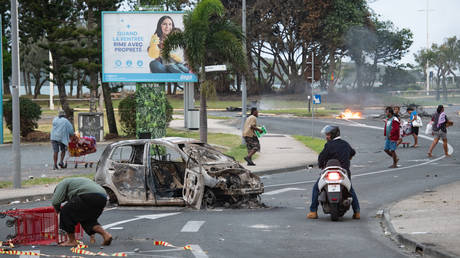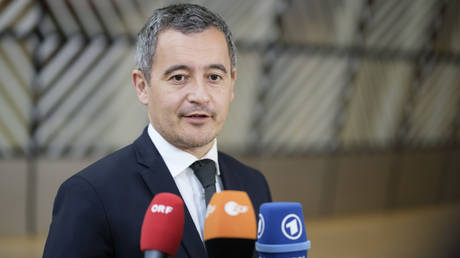Dumping Radioactive Water into the Pacific Ocean — a Hypothetical Scenario for Tokyo?
by Konstantin Asmolov, New Eastern Outlook:

It was not so long ago that we wrote about how radiophobia is being stoked up as part of the trade war between Japan and South Korea. Having brought this topic to the public’s attention, I would like to go into more detail and highlight people’s fears that “Japanese authorities are about to flood the world with millions of tons of contaminated water”
On March 11, 2011, earthquake tremors generated a tsunami wave which flooded the Fukushima Daiichi Nuclear Power Plant with 4-5 meters of water. This led to a power outage, a resultant loss-of-coolant accident, which caused the nuclear meltdown, and radioactive substances leaked out. Water was pumped into the reactor core for cooling, including seawater. The amount of contaminated water stored at the plant is increasing by 170 tons on a daily basis, and by the end of July, it had reached a total volume of 1 million 150 thousand tons. All of the treated water is stored in 977 sealed tanks, which are part of what has been an extremely costly and complex process to dispose of the contaminated water.
It is estimated that the storage space will run out by August 2020, and something will have to be done with all the water.
Thus, in August 2019, Senior Nuclear Specialist Shaun Burnie with Greenpeace Germany based in Berlin reported that Japan is considering the possibility of dumping the radioactive water into the Pacific Ocean. According to Shaun Burnie, this water will be carried to other parts of the world by sea currents, and a number of countries will suffer, including South Korea. In an interview with the Korea Times, Burnie explained that Japan’s desired solution had to do with greed: “They do not want to pay the full costs of storing and processing the contaminated water, including removal of radioactive tritium.” Most controversially, according to Burnie, this was the reason why the Ministry of Economy Task Force on water turned down the options offered by various companies to develop tritium removal technology back in 2016. This is an important point, as Japanese government officials say that tritium is the only radioactive element in the water, and that it is actually relatively non-toxic. Although according to the experts quoted in the Korea Times, it can cause cancer and fetal deformities.
According to a Greenpeace report published in early 2019, the Japanese government allegedly considered five options of how to deal with its increasing volume of radioactive waste, and dumping it into the Pacific Ocean was deemed to be the most reasonable option, as it would only cost 37.7 billion yen based on calculations from 2016 supplied by Japan’s Ministry of Economy, Trade and Industry.
However, the sources where all of this information has come from remain unknown. The South Korean media cite a news briefing with former Japanese Minister of the Environment Yoshiaki Harada, who said that “The only option will be to drain it into the sea and dilute it.” However, Japanese Chief Cabinet Secretary Yoshihide Suga commented that Harada’s remarks were just his own personal opinion, and that the government had not made any decision.
Other experts also believe that the waste may be dumped. Kim Ik-jung, a former medical professor at Dongguk University who served as a member of South Korea’s Nuclear Safety and Security Commission, points out that discharging contaminated water into the sea would be the cheapest and fastest way to get rid of it, but that it would also be the most dangerous option. According to Kim, we would have to wait about another 300 years before the water would be naturally purified and safe to discharge. However, this takes time and money.
Hiroaki Koide, an assistant professor at the Research Reactor Institute of Kyoto University in Japan, believes the Japanese government will go ahead and discharge the water contaminated with radiation into the sea in the near future, and that this should be stopped at all costs, even if it means boycotting the Tokyo Olympics — after the Games are held, the water is likely to be discharged. However, this is only an expert opinion, and it is unclear what it is based on. Back in 2018 however, the retired nuclear physicist submitted a document to the members of the Olympic Committee, questioning Japan’s suitability as the host country for the Olympics, and he also questioned the country’s ability to take the strict safety measures necessary to protect athletes and visitors at the event. According to Hiroaki Koide, athletes participating in the Games may be exposed to radiation, as it turns out that the radioactive materials that leaked out after the explosion at the Fukushima plant in 2011 are still affecting “an area whose vastness has not been precisely determined yet”, and by saying that there is no danger of radiation exposure, “the Japanese government was being dishonest.”
Shaun Burnie, as one would expect to hear from a specialist working for Greenpeace, supports this alarmist view: “[…] many citizens [are] living in areas with low radiation risks ― at the same time there are areas in Fukushima […] where radiation risks are high, and tens of thousands of citizens remain displaced as evacuees.”
Thus, Burnie is constantly raising this issue, essentially lobbying for South Korea’s position. For instance, on September 14, 2019, Burnie stressed that South Korea should raise this issue on an international platform.
There are mechanisms in place in international law to prevent the possible contaminated water from being released into the sea. There is the United Nations Convention on the Law of the Sea, for example, which requires that member states take measures to prevent, reduce or control pollution of the marine environment. Then there is also the London Convention on the Prevention of Marine Pollution by Dumping of Wastes and Other Matter, which is still in force. The International Atomic Energy Agency (IAEA) fights for safe nuclear energy, which should be notified when these kinds of actions are taken. However, each country determines its own permissible level of radioactive pollution that can be released into the sea independently: while South Korea sets its limit at 40 thousand becquerels per liter of water, Japan’s limit is 60 thousand. The value recorded at the Fukushima Nuclear Power Plant is 120 thousand becquerels.
Then, there is the general principle that we should prevent marine pollution, but no specific rules. For example, Japan could argue that discharging the water will not harm other countries. Tokyo can also justify its actions by claiming the event was a force majeure, given the huge volumes of radioactive water, which would make it difficult to prove these actions and their consequences are illegal.
That is why the government in Seoul is trying as hard as it can to make the international community sit up and take notice of this problem, and also wants to begin gathering evidence and data on the consequences we could be faced with if the contaminated water is discharged, all in the hope that the whole world will take a stand against it, making it harder for Japan to take this step.
In mid-August, the South Korean Ministry of Foreign Affairs appealed to the Japanese government to state its official position. Environment Minister Cho Myung-Rae also wrote on social media: “We’ve asked the Japanese government to share material about how it is coping with the contaminated water from Fukushima, but it has avoided giving answers.”
On September 16, 2019 at the 63rd Annual Regular Session of the IAEA General Conference held in Austria, South Korea’s First Minister of Science and ICT Mun Mi-ock noted that “In the meantime, high-level Japanese government officials recently started to state that marine discharges are inevitable as a way to deal with Fukushima contaminated water.” Mun believes there needs to be a survey carried out of the conditions at the reactor and its contaminated water, as well as an environmental and ecological impact assessment at the Fukushima Nuclear Power Plant, and the approach developed should be scientific, with more objective measures to solve the problem. She also urged Japan to take meaningful and transparent measures and action aimed at protecting the environment.
Meanwhile, a Japanese representative stressed the importance of security, noting the need to refrain from unscientific criticism, and it is worth adding that only the Korean side has the details about the Japanese officials making these types of statements, and there are no dates or names given for these officials.
Mun Mi-ock said in her keynote speech that “Japan has failed to find an answer to the disposal of the radioactive waste since the meltdown at the Fukushima plant in March 2011.” South Korean President Moon Jae-in later added, “It is an important international issue that can affect the marine environment of the whole world, so the IAEA and its members need to take joint action.”
Loading...



